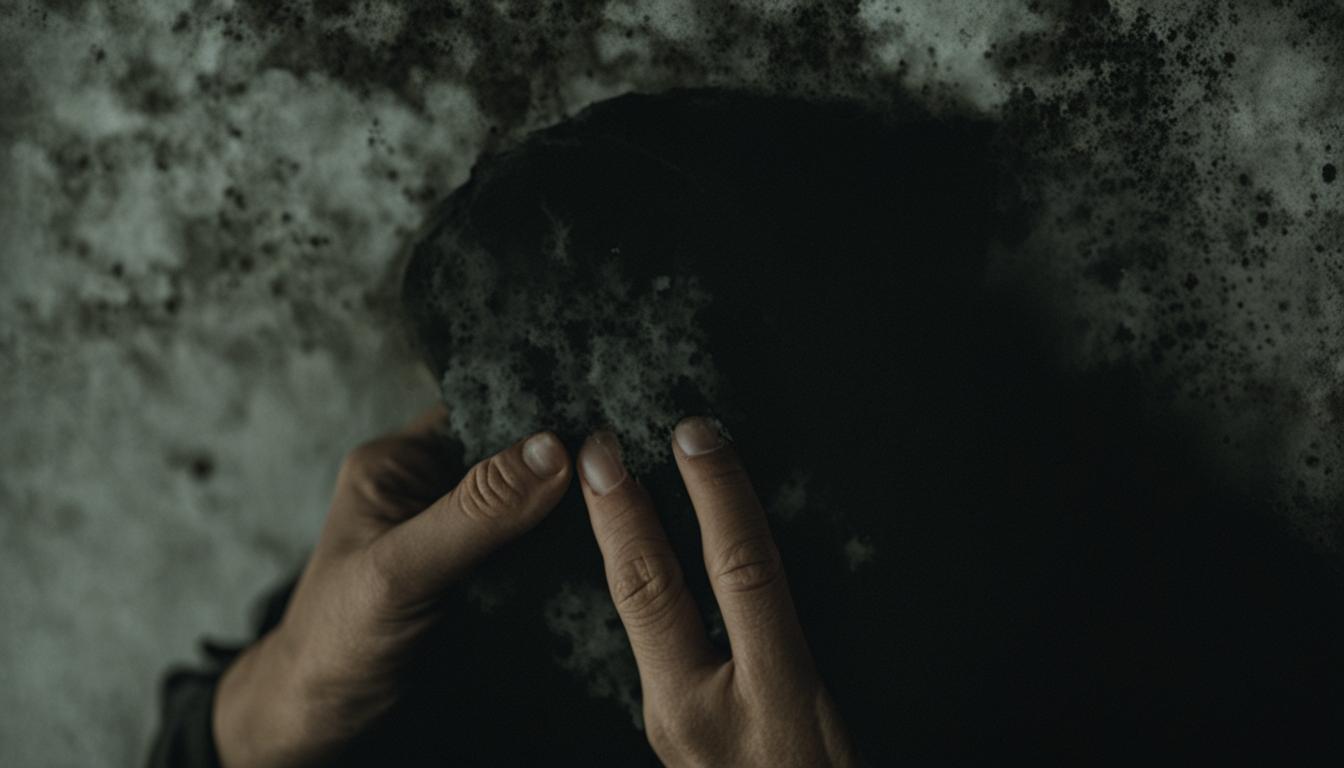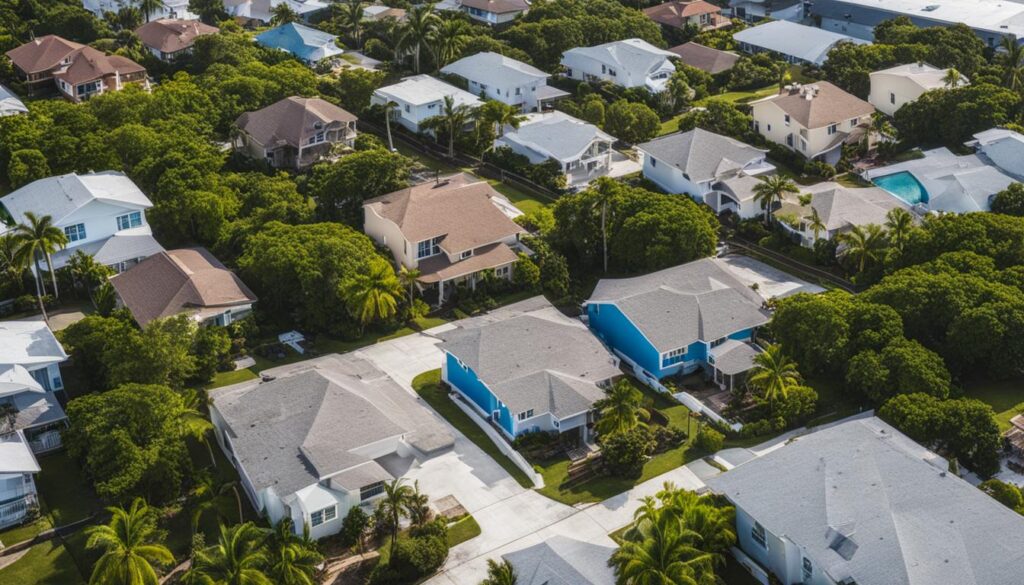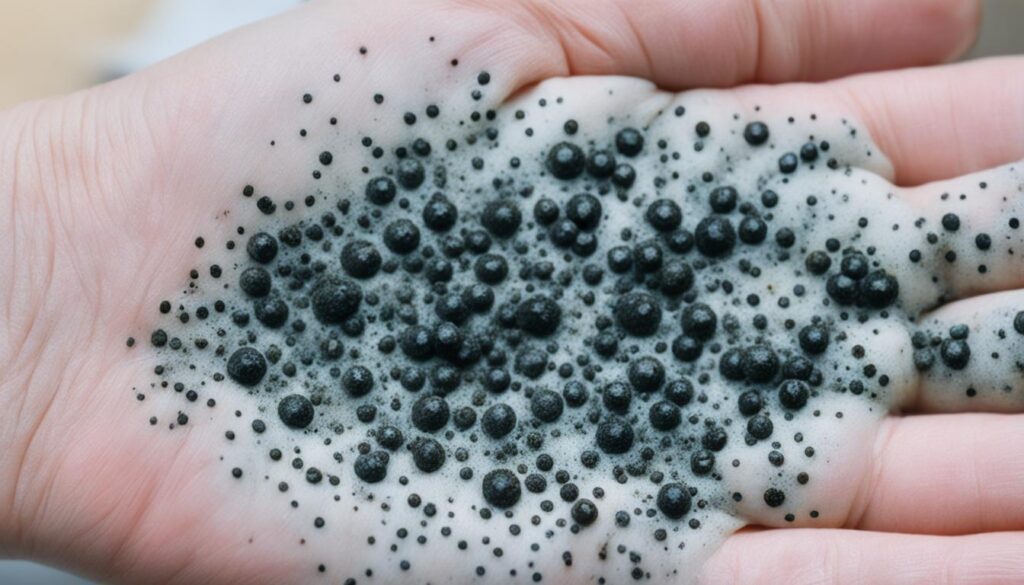
Black Mold Exposure: Recognize the Symptoms Now
Black mold exposure can pose serious health risks if left unaddressed. It is essential to recognize the symptoms associated with black mold to protect yourself and your loved ones. By understanding these symptoms, you can take prompt action and seek appropriate medical attention if necessary.
Key Takeaways:
- Recognizing the symptoms of black mold exposure is crucial for your well-being.
- Prompt action can help minimize the health risks associated with black mold exposure.
- Seeking professional assistance is recommended for proper assessment and remediation.
- Improving ventilation and maintaining cleanliness can help prevent black mold growth.
- Early detection and proactive measures are essential in safeguarding your health and home.
Signs of Black Mold in Your House
Knowing the signs of black mold in your house is crucial for the health and well-being of your family. Identifying these signs early on can help you address the issue promptly, preventing further exposure to this potentially harmful substance. Look out for the following indicators:
- Visible Mold Growth: Black mold often appears as black or greenish-black patches on walls, ceilings, or other surfaces. It thrives in moist, humid environments, so pay close attention to areas with water damage or high humidity levels.
- Musty Odor: A strong, musty smell is a telltale sign of mold growth. If you notice a persistent odor in certain areas of your house, it could indicate the presence of mold.
- Water Leaks or Damage: Mold needs moisture to grow, so any water leaks or water damage in your house can create an environment conducive to mold growth. Inspect areas prone to leaks, such as around pipes, windows, and roofs.
- Water Stains: Discoloration or water stains on walls, ceilings, or floors can indicate a water-related issue, which may lead to mold growth if not addressed promptly.
- Allergic Reactions: If you or your family members experience unexplained allergic reactions, such as sneezing, coughing, watery eyes, or a runny nose, especially when indoors, it could be a sign of mold presence.
- Respiratory Issues: Prolonged exposure to black mold can cause respiratory problems, including coughing, wheezing, nasal congestion, and throat irritation. If these symptoms persist or worsen, seek medical attention.
Remember, the presence of any of these signs does not guarantee the presence of black mold, but it should prompt further investigation. If you suspect black mold in your house, it is essential to take appropriate measures to protect your health and eliminate the problem.
“Early detection of black mold and prompt action are key to preventing further exposure and potential health risks.”
To give you a visual representation, here is a table summarizing the signs of black mold in your house:
| Signs of Black Mold in Your House | Description |
|---|---|
| Visible Mold Growth | Black or greenish-black patches on walls, ceilings, or surfaces |
| Musty Odor | Strong, persistent musty smell in certain areas of the house |
| Water Leaks or Damage | Presence of water leaks or water damage |
| Water Stains | Discoloration or water stains on walls, ceilings, or floors |
| Allergic Reactions | Unexplained allergic symptoms like sneezing, coughing, and watery eyes |
| Respiratory Issues | Coughing, wheezing, nasal congestion, and throat irritation |
By being vigilant and proactive, you can ensure a safe and healthy environment for you and your loved ones. Remember, if you suspect black mold in your house, it’s always best to consult a professional for proper assessment and remediation.
Health Effects of Black Mold Exposure
Black mold exposure can have serious health effects on individuals. Understanding these effects is crucial in identifying and addressing potential mold toxicity symptoms, black mold poisoning symptoms, mold illness symptoms, and toxic black mold symptoms.
One of the most common health effects of black mold exposure is respiratory issues. Inhaling mold spores can irritate the respiratory system, leading to symptoms such as coughing, wheezing, and shortness of breath. Individuals with pre-existing respiratory conditions, such as asthma or allergies, may experience exacerbated symptoms in the presence of black mold.
Allergic reactions are another common health effect caused by black mold exposure. Individuals may experience symptoms such as sneezing, runny nose, itchy eyes, and skin rashes. These symptoms can vary in severity, depending on the individual’s sensitivity to mold and the duration of exposure.
Black mold exposure can also affect the central nervous system, potentially leading to neurological symptoms. These symptoms may include headaches, dizziness, difficulty concentrating, and memory problems. Prolonged exposure to black mold can further contribute to mood swings, depression, and anxiety.
In some cases, black mold exposure can lead to more severe health issues. Individuals with weakened immune systems, such as those undergoing chemotherapy or living with HIV/AIDS, are especially vulnerable. They may develop fungal infections in the lungs, skin, or other organs.
“Black mold exposure can have a significant impact on an individual’s health, particularly if symptoms go unrecognized or untreated. Seeking proper medical attention and addressing the underlying mold problem are essential in mitigating the health risks associated with black mold exposure.”
To gain a better understanding of the health effects of black mold exposure, refer to the table below:
| Health Effects | Description |
|---|---|
| Respiratory Issues | Symptoms can include coughing, wheezing, and shortness of breath. |
| Allergic Reactions | Manifests as sneezing, runny nose, itchy eyes, and skin rashes. |
| Neurological Symptoms | Includes headaches, dizziness, difficulty concentrating, and memory problems. |
| Weakened Immune Response | Individuals with weakened immune systems may develop fungal infections. |
It’s important to recognize these symptoms and take appropriate action to ensure your well-being. If you suspect black mold exposure in your home, it is recommended to contact a professional mold inspector for a thorough assessment and remediation process.
Steps to Take for Mold Assessment and Prevention
When it comes to dealing with mold issues, it’s important to enlist the help of professionals who have the expertise and experience to provide effective solutions. Fix Mold Miami is a trusted provider of mold assessments, prevention, and remediation services. Whether you suspect the presence of mold in your home or want to take proactive measures to prevent its growth, their team can guide you through the necessary steps.
Here are some key steps you can take for mold assessment and prevention:
- Schedule a mold assessment: A professional mold assessment can identify the type and extent of mold growth in your home. Fix Mold Miami offers comprehensive assessments using advanced techniques to detect mold even in hard-to-reach areas.
- Address moisture issues: Moisture is a primary contributor to mold growth. Fix any leaks, repair water damage promptly, and ensure proper ventilation in areas prone to moisture build-up, such as bathrooms and basements.
- Improve indoor air circulation: Good air circulation helps prevent mold by reducing humidity and keeping surfaces dry. Use fans and dehumidifiers to maintain optimal humidity levels and promote air movement throughout your home.
- Maintain cleanliness: Regular cleaning helps prevent mold growth. Keep your home clean and dry, especially in areas susceptible to moisture, such as kitchens, bathrooms, and laundry rooms. Pay extra attention to areas where condensation or water accumulation is common.
- Monitor humidity levels: Install hygrometers to monitor humidity levels in your home. Ideally, indoor humidity should stay between 30% and 50%. If levels exceed this range, take appropriate measures to reduce moisture, such as using dehumidifiers.
To ensure comprehensive mold assessment and prevention, rely on the expertise of Fix Mold Miami. Their team can guide you through the process, addressing any concerns and providing tailored solutions for your specific situation.
By taking these proactive steps and working with professionals, you can minimize the risk of mold growth in your home and protect your health and the well-being of your family.

“Fix the moisture problem, and you’ll fix the mold problem.”
– Fix Mold Miami
Protecting Your Health from Black Mold Exposure
Black mold exposure can have serious health consequences. To safeguard yourself and your loved ones, it’s important to take proactive measures to minimize the risk of exposure. By implementing the following steps, you can protect your health and create a safer living environment.
Create a Well-Ventilated Space
Improving ventilation in your home is crucial to prevent the growth and spread of black mold. Ensure that your living spaces have proper airflow by opening windows regularly and using exhaust fans in areas prone to moisture, such as bathrooms and kitchens. This will help to reduce humidity levels and discourage mold growth.
Maintain Cleanliness
Regular cleaning is essential to prevent the accumulation of mold. Pay close attention to areas that are prone to moisture, such as bathrooms, basements, and kitchens. Use mold-inhibiting products to clean surfaces, and promptly address any water leaks or spills. Remember to dry wet areas completely to prevent mold development.
Control Moisture Levels
Keeping moisture levels in check is crucial for mold prevention. Use dehumidifiers in damp areas of your home to maintain relative humidity below 50%. Be vigilant for signs of moisture accumulation, such as condensation on windows or walls, and promptly address the underlying causes.
Regularly Inspect and Maintain Your Home
Inspect your home regularly for any signs of water damage or leaks. Addressing these issues promptly can prevent the growth of mold. Additionally, ensure that your home’s insulation and ventilation systems are maintained properly to minimize moisture accumulation.
To further protect your health, it’s important to be aware of the symptoms of black mold exposure. If you or your loved ones experience persistent symptoms such as coughing, wheezing, nasal congestion, or skin irritation, consult a medical professional immediately.
Remember, taking proactive steps to prevent black mold growth and exposure is crucial for your well-being. By creating a clean and well-ventilated living environment and promptly addressing any issues, you can minimize the risk and protect your health.

Conclusion
In conclusion, recognizing the symptoms of black mold exposure is crucial for protecting your health and the well-being of your home. By being aware of the signs and health effects associated with black mold, you can take proactive steps to prevent exposure and minimize the risks.
Early detection is key, as prompt action can prevent the spread of mold and its potential harmful effects. If you suspect black mold in your house, it is important to address the issue promptly to safeguard your health and the structural integrity of your home.
For professional assistance, you can contact Fix Mold Miami at 305-465-6653. Their team of experts specializes in mold assessments, prevention, and remediation, ensuring that you receive the necessary support and guidance to tackle any mold-related issues.




